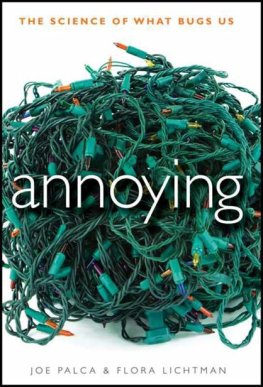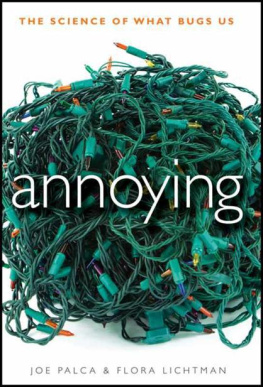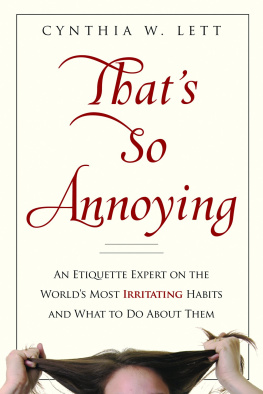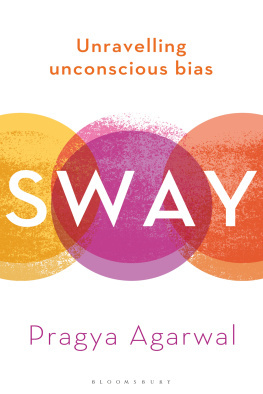Joe Palca and Flora Lichtman
ANNOYING
The Science of What Bugs Us
The trouble with investigating the science of annoyance is that unlike simple topics such as string theory or molecular genetics, the science of whats annoying is highly complex, drawing on multiple disciplines from physics, chemistry, and biology in the natural sciences to psychology, sociology, anthropology, and linguistics in the social sciences to history, literature, philosophy, and art in the humanities.
Indeed, the expert in annoyingness, if such a person existed, would be a true polymath. Of course, we all have some expertise in the sensationboth in generating it in others and feeling it within ourselves. In fact, when you tell somebody youre writing a book about the science of whats annoyingafter you get the guffaws out of the wayyou often hear a long diatribe about the annoying thing that happened just the other day. Its paradoxicalwe dont like being annoyed but seem to enjoy thinking about what annoys us. Although everyone can tell you whats annoying, few, if any, can explain why. Thats why we turned to science.
It may seem like a trivial pursuit, but think about it for a moment. Feeling annoyed seems to be a universal trait. Can you think of anyone who is immune to it? Although as a species modern humans appear to have become exquisitely sensitive to annoyances, other species look to be at risk as well. While animal behaviorists and microbiologists may disagree with the terminology, its difficult to argue with the statement that at least something remarkably similar to annoyance occurs across a broad swath of the animal kingdom. Older dogs become annoyed with pesky puppies; fruit flies are smart enough to avoid irritants; even bacteria will switch on their flagellums and move away when faced with the microbiological equivalent of fingernails on a blackboard. In the great tradition of reductionism, understanding these annoyances will surely tell us something about our own.
Although little direct research has been conducted on the topic, theres no shortage of relevant data: science has a lot to say about annoyance. In our quest to understand this feeling, we came across some patterns that help explain what makes something annoying. Dont expect a proof for a Grand Unified Theory of Annoyance; this is a scientific field in its infancy. We offer our findings as a place to start.
Introduction: Cell Phones
It can happen to anyone, at any time, in any placein public bathrooms, on trains, in schools, even in your own backyard. Youre never safe. For Mark Liberman, a linguist at the University of Pennsylvania, it happened at the gym. There was a young woman on the treadmill next to mine who was talking on her cell phone, and I was doing my best to tune it out, but she kept saying the same sentence over and over and over again. It was something like, Hes arriving tomorrow. I think she must have said it like ten or twelve times.
This is a classic case of cell phone annoyance. Liberman couldnt ignore the broken record on the treadmill next to him, and that was annoying. Why? Maybe it was annoying because talking on a cell phone when youre in a public space is rude.
Why is it rude? Lauren Emberson, a psychology graduate student who studied this, has an answer. I think the reason why is that we cant tune it out. We find it more rude than someone having a conversation around us because our attention is drawn in and that makes us irritated that we cant be doing the other things or thinking about the other things that we want to. Thats why it seems intrusive.
Its an interesting idea: what we find rude is what we cannot ignore. In terms of cell phone conversations, Liberman points out that some will be harder to ignore than otherslouder conversations will be more annoying, and the content of certain conversations may be more attention grabbing.
If you think its juicy content that keeps people tuned in to others cell calls, however, think again. The most mundane cell phone conversation, as Liberman found out at the gym, can be the hardest to ignore. It was maddening because I couldnt figure what could be going on that was causing her to repeat the same thing over and over again, Liberman says. It wasnt in itself very interesting; what was attention-getting was the unexpected fact of repetition. What was the conversational setting that would lead to this?
This perfectly embodies Embersons theory of what makes a cell phone conversationwhich she and her coauthors dub a halfalogueannoying. The repetition of the girl on the treadmill was annoying because it was distracting. It was distracting because, try as we mightand we do trywe cant even imagine how that conversation would make any sense.
The neighborhoods nearest to the campus of the University of British Columbia at Vancouver are expensivetoo expensive for students, says Emberson, who was a student there and didnt live near campus. She lived a forty-five-minute bus ride away, which translated to a lot of commuting, which translated to a lot of reading.
When Emberson was in college, cell phones were just starting to get popular. She didnt have one, and they annoyed her, especially on the bus. She wanted to read her essays on the philosophy of mind, but she found herself distracted by her bus-mates conversations. Being an academic, I couldnt stop at just being irritated, she recalls. I started thinking, Why was I irritated? I couldnt tune it out, and I used to think it was because I was nosy. But I actually didnt want to listen. I felt myself forced to, almost. For most people, thats not enough to go and do a study about it. It was for Emberson, though, who is now at Cornell University. She devised a study to test her hypothesis on why cell phone conversations are so irritating.
Everyone is annoyed by something. Many of us are annoyed by lots of things. Most of these annoyances have more to do with our personal sensitivitiesour neuroses, our upbringings, our points of viewthan any objective annoying quality. Other annoyances are so powerful, however, that they transcend race, gender, age, and culture. At the top of the list is that most convenient of modern conveniences, the cell phoneat least, when someone else is talking on it.
Researchers at the University of York have shown that cell phone chatter is particularly annoying compared to conversations in which listeners can hear both sides. You dont need to have a special sensitivity, its not a matter of taste, it doesnt have to remind you of something, and its not an intrinsic feature of the human voice. Cell phone conversations are different. Could there be something about this annoyance that taps into the essence of our humanness?
Emberson has a theory. It actually happened to fit into my emerging worldview about how we respond to information around us, she says. Her view is that when we hear half a conversation, such as when someone is talking on a cell phone, our brains are always predicting whats going to happen next, based on our current state of knowledgethis is how we learn about the world, but it also reflects how we are in the world. When something is unexpected, it draws our attention in, our brains tune into it because were this information-seeking, prediction-loving cognitive systemthis is the idea.
Although cell phones are fairly new, halfalogues arent a new annoyance. More than a century ago, Mark Twain railed against them. Twain was a man, let it be said, who found no shortage of annoyances in life, and American literature is all the richer for it. In 1880just four years after Alexander Graham Bell first exhibited his telephone at the Centennial Exposition in PhiladelphiaTwain wrote an essay called A Telephonic Conversation, in which he stated,










